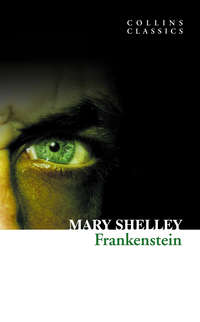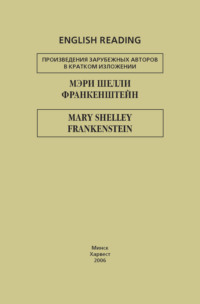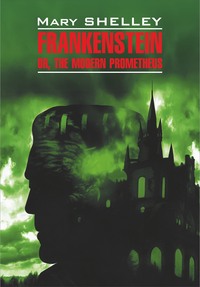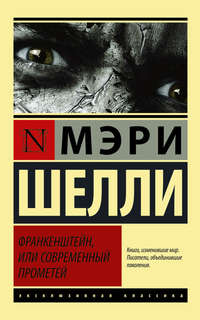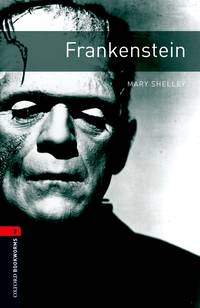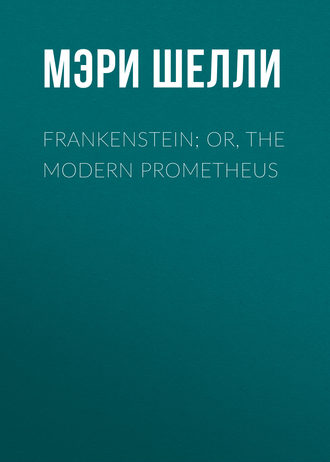 полная версия
полная версияFrankenstein; Or, The Modern Prometheus
CHAPTER IV
It was on a dreary night of November, that I beheld the accomplishment of my toils. With an anxiety that almost amounted to agony, I collected the instruments of life around me, that I might infuse a spark of being into the lifeless thing that lay at my feet. It was already one in the morning; the rain pattered dismally against the panes, and my candle was nearly burnt out, when, by the glimmer of the half-extinguished light, I saw the dull yellow eye of the creature open; it breathed hard, and a convulsive motion agitated its limbs.
How can I describe my emotions at this catastrophe, or how delineate the wretch whom with such infinite pains and care I had endeavoured to form? His limbs were in proportion, and I had selected his features as beautiful. Beautiful! – Great God! His yellow skin scarcely covered the work of muscles and arteries beneath; his hair was of a lustrous black, and flowing; his teeth of a pearly whiteness; but these luxuriances only formed a more horrid contrast with his watery eyes, that seemed almost of the same colour as the dun white sockets in which they were set, his shrivelled complexion, and straight black lips.
The different accidents of life are not so changeable as the feelings of human nature. I had worked hard for nearly two years, for the sole purpose of infusing life into an inanimate body. For this I had deprived myself of rest and health. I had desired it with an ardour that far exceeded moderation; but now that I had finished, the beauty of the dream vanished, and breathless horror and disgust filled my heart. Unable to endure the aspect of the being I had created, I rushed out of the room, and continued a long time traversing my bed-chamber, unable to compose my mind to sleep. At length lassitude succeeded to the tumult I had before endured; and I threw myself on the bed in my clothes, endeavouring to seek a few moments of forgetfulness. But it was in vain: I slept indeed, but I was disturbed by the wildest dreams. I thought I saw Elizabeth, in the bloom of health, walking in the streets of Ingolstadt. Delighted and surprised, I embraced her; but as I imprinted the first kiss on her lips, they became livid with the hue of death; her features appeared to change, and I thought that I held the corpse of my dead mother in my arms; a shroud enveloped her form, and I saw the grave-worms crawling in the folds of the flannel. I started from my sleep with horror; a cold dew covered my forehead, my teeth chattered, and every limb became convulsed; when, by the dim and yellow light of the moon, as it forced its way through the window-shutters, I beheld the wretch – the miserable monster whom I had created. He held up the curtain of the bed; and his eyes, if eyes they may be called, were fixed on me. His jaws opened, and he muttered some inarticulate sounds, while a grin wrinkled his cheeks. He might have spoken, but I did not hear; one hand was stretched out, seemingly to detain me, but I escaped, and rushed down stairs. I took refuge in the court-yard belonging to the house which I inhabited; where I remained during the rest of the night, walking up and down in the greatest agitation, listening attentively, catching and fearing each sound as if it were to announce the approach of the demoniacal corpse to which I had so miserably given life.
Oh! no mortal could support the horror of that countenance. A mummy again endued with animation could not be so hideous as that wretch. I had gazed on him while unfinished; he was ugly then; but when those muscles and joints were rendered capable of motion, it became a thing such as even Dante could not have conceived.
I passed the night wretchedly. Sometimes my pulse beat so quickly and hardly, that I felt the palpitation of every artery; at others, I nearly sank to the ground through languor and extreme weakness. Mingled with this horror, I felt the bitterness of disappointment: dreams that had been my food and pleasant rest for so long a space, were now become a hell to me; and the change was so rapid, the overthrow so complete!
Morning, dismal and wet, at length dawned, and discovered to my sleepless and aching eyes the church of Ingolstadt, its white steeple and clock, which indicated the sixth hour. The porter opened the gates of the court, which had that night been my asylum, and I issued into the streets, pacing them with quick steps, as if I sought to avoid the wretch whom I feared every turning of the street would present to my view. I did not dare return to the apartment which I inhabited, but felt impelled to hurry on, although wetted by the rain, which poured from a black and comfortless sky.
I continued walking in this manner for some time, endeavouring, by bodily exercise, to ease the load that weighed upon my mind. I traversed the streets, without any clear conception of where I was, or what I was doing. My heart palpitated in the sickness of fear; and I hurried on with irregular steps, not daring to look about me:
Like one who, on a lonely road,Doth walk in fear and dread,And, having once turn’d round, walks on,And turns no more his head;Because he knows a frightful fiendDoth close behind him tread.Continuing thus, I came at length opposite to the inn at which the various diligences and carriages usually stopped. Here I paused, I knew not why; but I remained some minutes with my eyes fixed on a coach that was coming towards me from the other end of the street. As it drew nearer, I observed that it was the Swiss diligence: it stopped just where I was standing; and, on the door being opened, I perceived Henry Clerval, who, on seeing me, instantly sprung out. “My dear Frankenstein,” exclaimed he, “how glad I am to see you! how fortunate that you should be here at the very moment of my alighting!”
Nothing could equal my delight on seeing Clerval; his presence brought back to my thoughts my father, Elizabeth, and all those scenes of home so dear to my recollection. I grasped his hand, and in a moment forgot my horror and misfortune; I felt suddenly, and for the first time during many months, calm and serene joy. I welcomed my friend, therefore, in the most cordial manner, and we walked towards my college. Clerval continued talking for some time about our mutual friends, and his own good fortune in being permitted to come to Ingolstadt. “You may easily believe,” said he, “how great was the difficulty to persuade my father that it was not absolutely necessary for a merchant not to understand any thing except book-keeping; and, indeed, I believe I left him incredulous to the last, for his constant answer to my unwearied entreaties was the same as that of the Dutch schoolmaster in the Vicar of Wakefield: ‘I have ten thousand florins a year without Greek, I eat heartily without Greek.’ But his affection for me at length overcame his dislike of learning, and he has permitted me to undertake a voyage of discovery to the land of knowledge.”
“It gives me the greatest delight to see you; but tell me how you left my father, brothers, and Elizabeth.”
“Very well, and very happy, only a little uneasy that they hear from you so seldom. By the bye, I mean to lecture you a little upon their account myself. – But, my dear Frankenstein,” continued he, stopping short, and gazing full in my face, “I did not before remark how very ill you appear; so thin and pale; you look as if you had been watching for several nights.”
“You have guessed right; I have lately been so deeply engaged in one occupation, that I have not allowed myself sufficient rest, as you see: but I hope, I sincerely hope, that all these employments are now at an end, and that I am at length free.”
I trembled excessively; I could not endure to think of, and far less to allude to the occurrences of the preceding night. I walked with a quick pace, and we soon arrived at my college. I then reflected, and the thought made me shiver, that the creature whom I had left in my apartment might still be there, alive, and walking about. I dreaded to behold this monster; but I feared still more that Henry should see him. Entreating him therefore to remain a few minutes at the bottom of the stairs, I darted up towards my own room. My hand was already on the lock of the door before I recollected myself. I then paused; and a cold shivering came over me. I threw the door forcibly open, as children are accustomed to do when they expect a spectre to stand in waiting for them on the other side; but nothing appeared. I stepped fearfully in: the apartment was empty; and my bedroom was also freed from its hideous guest. I could hardly believe that so great a good-fortune could have befallen me; but when I became assured that my enemy had indeed fled, I clapped my hands for joy, and ran down to Clerval.
We ascended into my room, and the servant presently brought breakfast; but I was unable to contain myself. It was not joy only that possessed me; I felt my flesh tingle with excess of sensitiveness, and my pulse beat rapidly. I was unable to remain for a single instant in the same place; I jumped over the chairs, clapped my hands, and laughed aloud. Clerval at first attributed my unusual spirits to joy on his arrival; but when he observed me more attentively, he saw a wildness in my eyes for which he could not account; and my loud, unrestrained, heartless laughter, frightened and astonished him.
“My dear Victor,” cried he, “what, for God’s sake, is the matter? Do not laugh in that manner. How ill you are! What is the cause of all this?”
“Do not ask me,” cried I, putting my hands before my eyes, for I thought I saw the dreaded spectre glide into the room; “he can tell. – Oh, save me! save me!” I imagined that the monster seized me; I struggled furiously, and fell down in a fit.
Poor Clerval! what must have been his feelings? A meeting, which he anticipated with such joy, so strangely turned to bitterness. But I was not the witness of his grief; for I was lifeless, and did not recover my senses for a long, long time.
This was the commencement of a nervous fever, which confined me for several months. During all that time Henry was my only nurse. I afterwards learned that, knowing my father’s advanced age, and unfitness for so long a journey, and how wretched my sickness would make Elizabeth, he spared them this grief by concealing the extent of my disorder. He knew that I could not have a more kind and attentive nurse than himself; and, firm in the hope he felt of my recovery, he did not doubt that, instead of doing harm, he performed the kindest action that he could towards them.
But I was in reality very ill; and surely nothing but the unbounded and unremitting attentions of my friend could have restored me to life. The form of the monster on whom I had bestowed existence was for ever before my eyes, and I raved incessantly concerning him. Doubtless my words surprised Henry: he at first believed them to be the wanderings of my disturbed imagination; but the pertinacity with which I continually recurred to the same subject persuaded him that my disorder indeed owed its origin to some uncommon and terrible event.
By very slow degrees, and with frequent relapses, that alarmed and grieved my friend, I recovered. I remember the first time I became capable of observing outward objects with any kind of pleasure, I perceived that the fallen leaves had disappeared, and that the young buds were shooting forth from the trees that shaded my window. It was a divine spring; and the season contributed greatly to my convalescence. I felt also sentiments of joy and affection revive in my bosom; my gloom disappeared, and in a short time I became as cheerful as before I was attacked by the fatal passion.
“Dearest Clerval,” exclaimed I, “how kind, how very good you are to me. This whole winter, instead of being spent in study, as you promised yourself, has been consumed in my sick room. How shall I ever repay you? I feel the greatest remorse for the disappointment of which I have been the occasion; but you will forgive me.”
“You will repay me entirely, if you do not discompose yourself, but get well as fast as you can; and since you appear in such good spirits, I may speak to you on one subject, may I not?”
I trembled. One subject! what could it be? Could he allude to an object on whom I dared not even think?
“Compose yourself,” said Clerval, who observed my change of colour, “I will not mention it, if it agitates you; but your father and cousin would be very happy if they received a letter from you in your own hand-writing. They hardly know how ill you have been, and are uneasy at your long silence.”
“Is that all? my dear Henry. How could you suppose that my first thought would not fly towards those dear, dear friends whom I love, and who are so deserving of my love.”
“If this is your present temper, my friend, you will perhaps be glad to see a letter that has been lying here some days for you: it is from your cousin, I believe.”
CHAPTER V
Clerval then put the following letter into my hands.
“To V. Frankenstein“My Dear Cousin,
“I cannot describe to you the uneasiness we have all felt concerning your health. We cannot help imagining that your friend Clerval conceals the extent of your disorder: for it is now several months since we have seen your hand-writing; and all this time you have been obliged to dictate your letters to Henry. Surely, Victor, you must have been exceedingly ill; and this makes us all very wretched, as much so nearly as after the death of your dear mother. My uncle was almost persuaded that you were indeed dangerously ill, and could hardly be restrained from undertaking a journey to Ingolstadt. Clerval always writes that you are getting better; I eagerly hope that you will confirm this intelligence soon in your own hand-writing; for indeed, indeed, Victor, we are all very miserable on this account. Relieve us from this fear, and we shall be the happiest creatures in the world. Your father’s health is now so vigorous, that he appears ten years younger since last winter. Ernest also is so much improved, that you would hardly know him: he is now nearly sixteen, and has lost that sickly appearance which he had some years ago; he is grown quite robust and active.
“My uncle and I conversed a long time last night about what profession Ernest should follow. His constant illness when young has deprived him of the habits of application; and now that he enjoys good health, he is continually in the open air, climbing the hills, or rowing on the lake. I therefore proposed that he should be a farmer; which you know, Cousin, is a favourite scheme of mine. A farmer’s is a very healthy happy life; and the least hurtful, or rather the most beneficial profession of any. My uncle had an idea of his being educated as an advocate, that through his interest he might become a judge. But, besides that he is not at all fitted for such an occupation, it is certainly more creditable to cultivate the earth for the sustenance of man, than to be the confidant, and sometimes the accomplice, of his vices; which is the profession of a lawyer. I said, that the employments of a prosperous farmer, if they were not a more honourable, they were at least a happier species of occupation than that of a judge, whose misfortune it was always to meddle with the dark side of human nature. My uncle smiled, and said, that I ought to be an advocate myself, which put an end to the conversation on that subject.
“And now I must tell you a little story that will please, and perhaps amuse you. Do you not remember Justine Moritz? Probably you do not; I will relate her history, therefore, in a few words. Madame Moritz, her mother, was a widow with four children, of whom Justine was the third. This girl had always been the favourite of her father; but, through a strange perversity, her mother could not endure her, and, after the death of M. Moritz, treated her very ill. My aunt observed this; and, when Justine was twelve years of age, prevailed on her mother to allow her to live at her house. The republican institutions of our country have produced simpler and happier manners than those which prevail in the great monarchies that surround it. Hence there is less distinction between the several classes of its inhabitants; and the lower orders being neither so poor nor so despised, their manners are more refined and moral. A servant in Geneva does not mean the same thing as a servant in France and England. Justine, thus received in our family, learned the duties of a servant; a condition which, in our fortunate country, does not include the idea of ignorance, and a sacrifice of the dignity of a human being.
“After what I have said, I dare say you well remember the heroine of my little tale: for Justine was a great favourite of your’s; and I recollect you once remarked, that if you were in an ill humour, one glance from Justine could dissipate it, for the same reason that Ariosto gives concerning the beauty of Angelica – she looked so frank-hearted and happy. My aunt conceived a great attachment for her, by which she was induced to give her an education superior to that which she had at first intended. This benefit was fully repaid; Justine was the most grateful little creature in the world: I do not mean that she made any professions, I never heard one pass her lips; but you could see by her eyes that she almost adored her protectress. Although her disposition was gay, and in many respects inconsiderate, yet she paid the greatest attention to every gesture of my aunt. She thought her the model of all excellence, and endeavoured to imitate her phraseology and manners, so that even now she often reminds me of her.
“When my dearest aunt died, every one was too much occupied in their own grief to notice poor Justine, who had attended her during her illness with the most anxious affection. Poor Justine was very ill; but other trials were reserved for her.
“One by one, her brothers and sister died; and her mother, with the exception of her neglected daughter, was left childless. The conscience of the woman was troubled; she began to think that the deaths of her favourites was a judgment from heaven to chastise her partiality. She was a Roman Catholic; and I believe her confessor confirmed the idea which she had conceived. Accordingly, a few months after your departure for Ingolstadt, Justine was called home by her repentant mother. Poor girl! she wept when she quitted our house: she was much altered since the death of my aunt; grief had given softness and a winning mildness to her manners, which had before been remarkable for vivacity. Nor was her residence at her mother’s house of a nature to restore her gaiety. The poor woman was very vacillating in her repentance. She sometimes begged Justine to forgive her unkindness, but much oftener accused her of having caused the deaths of her brothers and sister. Perpetual fretting at length threw Madame Moritz into a decline, which at first increased her irritability, but she is now at peace for ever. She died on the first approach of cold weather, at the beginning of this last winter. Justine has returned to us; and I assure you I love her tenderly. She is very clever and gentle, and extremely pretty; as I mentioned before, her mien and her expressions continually remind me of my dear aunt.
“I must say also a few words to you, my dear cousin, of little darling William. I wish you could see him; he is very tall of his age, with sweet laughing blue eyes, dark eye-lashes, and curling hair. When he smiles, two little dimples appear on each cheek, which are rosy with health. He has already had one or two little wives, but Louisa Biron is his favourite, a pretty little girl of five years of age.
“Now, dear Victor, I dare say you wish to be indulged in a little gossip concerning the good people of Geneva. The pretty Miss Mansfield has already received the congratulatory visits on her approaching marriage with a young Englishman, John Melbourne, Esq. Her ugly sister, Manon, married M. Duvillard, the rich banker, last autumn. Your favourite schoolfellow, Louis Manoir, has suffered several misfortunes since the departure of Clerval from Geneva. But he has already recovered his spirits, and is reported to be on the point of marrying a very lively pretty Frenchwoman, Madame Tavernier. She is a widow, and much older than Manoir; but she is very much admired, and a favourite with every body.
“I have written myself into good spirits, dear cousin; yet I cannot conclude without again anxiously inquiring concerning your health. Dear Victor, if you are not very ill, write yourself, and make your father and all of us happy; or – I cannot bear to think of the other side of the question; my tears already flow. Adieu, my dearest cousin.”
“Elizabeth Lavenza.“Geneva, March 18th, 17 – .”
“Dear, dear Elizabeth!” I exclaimed when I had read her letter, “I will write instantly, and relieve them from the anxiety they must feel.” I wrote, and this exertion greatly fatigued me; but my convalescence had commenced, and proceeded regularly. In another fortnight I was able to leave my chamber.
One of my first duties on my recovery was to introduce Clerval to the several professors of the university. In doing this, I underwent a kind of rough usage, ill befitting the wounds that my mind had sustained. Ever since the fatal night, the end of my labours, and the beginning of my misfortunes, I had conceived a violent antipathy even to the name of natural philosophy. When I was otherwise quite restored to health, the sight of a chemical instrument would renew all the agony of my nervous symptoms. Henry saw this, and had removed all my apparatus from my view. He had also changed my apartment; for he perceived that I had acquired a dislike for the room which had previously been my laboratory. But these cares of Clerval were made of no avail when I visited the professors. M. Waldman inflicted torture when he praised, with kindness and warmth, the astonishing progress I had made in the sciences. He soon perceived that I disliked the subject; but, not guessing the real cause, he attributed my feelings to modesty, and changed the subject from my improvement to the science itself, with a desire, as I evidently saw, of drawing me out. What could I do? He meant to please, and he tormented me. I felt as if he had placed carefully, one by one, in my view those instruments which were to be afterwards used in putting me to a slow and cruel death. I writhed under his words, yet dared not exhibit the pain I felt. Clerval, whose eyes and feelings were always quick in discerning the sensations of others, declined the subject, alleging, in excuse, his total ignorance; and the conversation took a more general turn. I thanked my friend from my heart, but I did not speak. I saw plainly that he was surprised, but he never attempted to draw my secret from me; and although I loved him with a mixture of affection and reverence that knew no bounds, yet I could never persuade myself to confide to him that event which was so often present to my recollection, but which I feared the detail to another would only impress more deeply.
M. Krempe was not equally docile; and in my condition at that time, of almost insupportable sensitiveness, his harsh blunt encomiums gave me even more pain than the benevolent approbation of M. Waldman. “D – n the fellow!” cried he; “why, M. Clerval, I assure you he has outstript us all. Aye, stare if you please; but it is nevertheless true. A youngster who, but a few years ago, believed Cornelius Agrippa as firmly as the gospel, has now set himself at the head of the university; and if he is not soon pulled down, we shall all be out of countenance. – Aye, aye,” continued he, observing my face expressive of suffering, “M. Frankenstein is modest; an excellent quality in a young man. Young men should be diffident of themselves, you know, M. Clerval; I was myself when young: but that wears out in a very short time.”
M. Krempe had now commenced an eulogy on himself, which happily turned the conversation from a subject that was so annoying to me.
Clerval was no natural philosopher. His imagination was too vivid for the minutiæ of science. Languages were his principal study; and he sought, by acquiring their elements, to open a field for self-instruction on his return to Geneva. Persian, Arabic, and Hebrew, gained his attention, after he had made himself perfectly master of Greek and Latin. For my own part, idleness had ever been irksome to me; and now that I wished to fly from reflection, and hated my former studies, I felt great relief in being the fellow-pupil with my friend, and found not only instruction but consolation in the works of the orientalists. Their melancholy is soothing, and their joy elevating to a degree I never experienced in studying the authors of any other country. When you read their writings, life appears to consist in a warm sun and garden of roses, – in the smiles and frowns of a fair enemy, and the fire that consumes your own heart. How different from the manly and heroical poetry of Greece and Rome.


